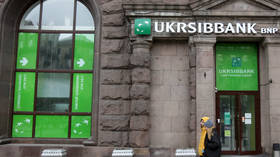US blames Russia for cyberattacks on Ukrainian banks

The White House has pinned responsibility for a recent burst of DDoS attacks directed at the Ukrainian Ministry of Defense and state-owned banks on Russia.
“We believe that the Russian government is responsible for wide-scale cyberattacks on Ukrainian banks this week,” the deputy national security adviser for cyber and emerging technology, Anne Neuberger, announced during a press conference on Friday, claiming assets belonging to Russia’s military intelligence, formerly known as GRU, were seen transmitting high volumes of communication to Ukraine-based IP addresses and domains and that this transmission was solid proof of malicious activities.
Neuberger explained away her agency’s rush to attribute the attacks to Moscow by declaring that Russia “counts on a long process of attribution so it can continue its malicious behavior against Ukraine in cyberspace, including pre-positioning for its potential invasion.”
Admitting the DDoS attacks had had “limited impact” on the Ukrainian financial system, Neuberger nevertheless warned that they were “consistent with what a Russian effort could look like in laying the groundwork for more disruptive cyberattacks accompanying a potential further invasion of Ukraine’s sovereign territory.” She admitted there were no credible threats to the US from Russia, but spoke at length about the cyber-reinforcement being mandated across American utilities, particularly with regard to pipelines as well as the aviation and railroad sectors.
Deputy National Security Advisor Daleep Singh threatened further sanctions and export controls against Russia, dismissing the notion that Russia has a “sanctions-proof economy” and insisting President Vladimir Putin is holding a “very weak strategic hand.” He repeatedly dismissed the notion that Russia could acquire high-tech goods and other necessities from China, insisting that barring Moscow from buying American would mortally wound its economy.
“I can assure you the measures that we have prepared, the severity of those measures and the institutions that we would impose them upon and the immediacy of those sanctions are among the most severe sanctions that have ever been contemplated,” Singh said.
However, he reiterated that exiling Russia from the SWIFT financial system had been ruled out due to the possibility of “spillover effects,” and emphasized that any controls placed on the Russian economy were “not designed to reduce or impair Russia’s ability to supply energy to the world.”
White House press secretary Jen Psaki reminded the assembled journalists that the Biden administration believes Russia will invade Ukraine in the coming days, though the specific date predicted by Western media came and went uneventfully on Wednesday. Meanwhile, Secretary of State Antony Blinken has accepted an offer from Russian FM Sergey Lavrov to meet on February 23.













